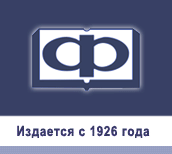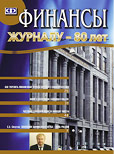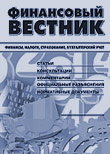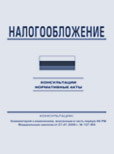Содержание
КАЗНАЧЕЙСТВО: СТАНОВЛЕНИЕ И РАЗВИТИЕ
Р.Е. Артюхин, руководитель Казначейства России
E-mail: finance-journal@mail.ru
В статье приводится информа/ция по материалам расширенного заседания Федерального казначейства, которое состоялось 06.03.2025. Традиционно на Коллегии были подведены итоги деятельности ведомства за прошедший год и поставлены задачи на 2025 г. Среди последних названы такие, как обеспечение реализации показателей государственной программы «Управление государственными финансами и регулирование финансовых рынков», Стратегической карты Федерального казначейства, Плана деятельности Федерального казначейства на 2025 год, поддержания высокого уровня исполнения федерального бюджета.
Ключевые слова: Казначейство России, Коллегия Федерального казначейства, цифровизация, совершенствование системы казначейских платежей, казначейское сопровождение, расширение казначейского мониторинга, закупки.
К 80-Й ГОДОВЩИНЕ ВЕЛИКОЙ ПОБЕДЫ
Н.М. Сабитова, профессор кафедры финансовых рынков и финансовых институтов Института управления, экономики и финансов Казанского (Приволжского) федерального университета, доктор экономических наук, профессор
E-mail: NMSabitova@kpfu.ru
Ч.М. Шавалеева, заместитель директора Центра непрерывного повышения профессионального мастерства педагогических работников Республики Татарстан Института психологии и образования Казанского (Приволжского) федерального университета, кандидат экономических наук, доцент
E-mail: chulpan212@mail.ru
Данная статья посвящена 80-летию Победы СССР в Великой Отечественной войне. В ней рассматриваются вопросы финансового обеспечения этой Победы. На основе данных статистики показано, что страна смогла мобилизовать финансовые ресурсы, чтобы противостоять немецкой агрессии. Несмотря на тяжелую ситуацию с поступлениями доходов в государственный бюджет СССР, который достиг уровня 1940 г. только в 1943 г., бюджетная система СССР обеспечивала финансирование значительно выросших расходов на оборону. Поступления доходов в бюджетную систему СССР обеспечивались новыми налогами с населения, а также займами по подписке и другими доходами. Показана важная роль населения в финансовом обеспечении военных расходов, которое принимало активное участие в формировании доходов государственного бюджета СССР. Отмечается четкая работа бюджетной системы СССР, которая смогла мобилизовать дополнительные доходы государственного бюджета СССР и создать условия для этой Победы. Авторы считают, что в настоящее время требуют более внимательного и глубокого изучения вопросы, связанные с финансовым обеспечением в короткий период времени всех народно-хозяйственных объектов и важных работ.
Ключевые слова: Великая Отечественная война, государственный бюджет, расходы бюджета, доходы бюджета, государственные заимствования.
Ю.П. Никольская, кандидат экономических наук, доцент
E-mail: nikolska@list.ru
В статье рассказано о непростых судьбах двух ветеранов Великой Отечественной войны, инвалидов, ставших финансистами. Встретившись в общежитии Московского финансового института, Н.П. Василов и П.С. Никольский пронесли дружбу через всю жизнь.
Ключевые слова: Великая Отечественная война, госпиталь, инвалидность, Московский финансовый институт, диссертация.
ФИНАНСЫ И БЮДЖЕТ: ПРОБЛЕМЫ И РЕШЕНИЯ
И.В. Кивико, заместитель Председателя Совета министров Республики Крым – министр финансов Республики Крым, кандидат экономических наук
E-mail: ud@minfin.rk.gov.ru
Эффективное функционирование финансовой системы в настоящее время во многом зависит от деятельности государственных регулирующих институтов, макроэкономической политики, уровня благосостояния и динамики доходов граждан и бизнеса, автоматизации и оптимизации процессов. Среди последних – развития цифровых технологий. В статье отражена история управления бюджетным процессом Республики Крым начиная с 2014 г., а также перспективные направления развития электронного бюджета Республики Крым, в частности переход к концепции «Цифровой регион», который позволит объединить в единое информационное пространство не только системы финансового учета Министерства финансов Республики Крым, но и другие информационные системы органов исполнительной власти Республики Крым, которые сейчас работают автономно.
Ключевые слова: Республика Крым, цифровые технологии, общественные финансы.
С.В. Ануреев, профессор кафедры общественных финансов Финансового университета при Правительстве Российской Федерации, доктор экономических наук
E-mail: SVAnureev@fa.ru
Традиционный бюджет для граждан является упрощением профессиональной бюджетной классификации и не ясен гражданам в конкретике влияния на их жизнь. В международных рекомендациях и в отечественных исследованиях предлагаются форматы бюджета для граждан для отдельных социальных групп. В данной статье обосновывается полезность и возможность представления каждому гражданину персональных данных о доходах и расходах бюджетов применительно к нему и его родственникам. Предлагается сочетание персональных данных личного кабинета налогоплательщика, Социального фонда России, портала государственных услуг, а также нормативов субсидий государственного задания и стоимости единицы услуг. Персональный бюджет для граждан может стать инструментом разъяснения связи уплаты налогов и оказания государственных услуг, а потенциально – выявления диспропорций в занятости, налогах, социальных статусах и государственных услугах. Это можно включить в национальный проект «Экономика данных».
Ключевые слова: собираемость налогов, адресность государственных услуг, нормативы субсидий, подушевое финансирование, социальный сертификат, цифровая экономика, экономика данных.
НАЛОГИ: ТЕОРИЯ И ПРАКТИКА
Л.Ш. Юлгушева, доцент кафедры государственных и муниципаль-ных финансов РЭУ имени Г.В. Плеханова, руководитель практики по оказанию услуг частным клиентам ФБК Legal, кандидат экономических наук
E-mail: lilia.yulgusheva@gmail.com
В статье анализируются проблемы реализации взаимосогласительной процедуры, особенно при совершении публичного налогового злоупотребления в условиях недобросовестной налоговой конкуренции, и перспективы применения международного налогового арбитража для защиты прав налогоплательщиков. Обоснована целесообразность формирования специального наднационального органа для рассмотрения международных налоговых споров и перевода международного налогового арбитража в институциональную плоскость для противодействия публичным налоговым злоупотреблениям. По мнению автора, такой контролирующий орган может быть также посредником при проведении взаимосогласительной процедуры, а в случае недостижимости решения, которое бы отвечало защите прав налогоплательщиков – площадкой для разрешения споров.
Ключевые слова: двойное налогообложение; взаимосогласительная процедура; международные налоговые отношения; недобросовестная налоговая конкуренция; международный налоговый арбитраж.
М.И. Львова, доцент кафедры государственного и муниципального управления Уральского государственного экономического университета (г. Екатеринбург), кандидат экономических наук
E-mail: minlvova@mail.ru
С.Д. Алексеев, старший государственный налоговый инспектор Управления ФНС России по Свердловской области, магистрант кафедры государственного и муниципального управления Уральского государственного экономического университета (г. Екатеринбург)
E-mail: framezor@mail.ru
В статье рассмотрены вопросы развития примирительных процедур в налоговых правоотношениях. Авторами проведен анализ правового регулирования и практики применения в Российской Федерации альтернативных внесудебных форм урегулирования налоговых споров. Изучен, проанализирован и обобщен опыт зарубежных стран в части использования примирительных процедур в целях прекращения налогового спора. Сделан вывод об обоснованности применения и расширения форм примирительных процедур в правовом регулировании налоговых отношений Российской Федерации в целях повышения продуктивности разрешения споров, сокращения издержек среди участников споров и снижения нагрузки на судебную систему государства. Установлены проблемы, препятствующие эффективному применению форм примирительных процедур к налоговым правоотношениям, приведены возможные пути их решения.
Ключевые слова: примирительные процедуры, налоговые правоотношения, налоговая легитимизация, медиация.
ФИНАНСОВЫЙ КОНТРОЛЬ И АУДИТ
С.О. Турыгин, ведущий специалист отдела по осуществлению контроля в сфере закупок и учета обязательств департамента казначейского исполнения бюджета Комитета финансов Ленинградской области
E-mail: sturygin99@mail.ru
В.В. Иванов, профессор кафедры теории кредита и финансового менеджмента Санкт-Петербургского государственного университета, доктор экономических наук, профессор
E-mail: zlivv@mail.ru
Статья посвящена вопросам развития системы оценки качества контрольной деятельности, проводимой органами внутреннего государственного финансового контроля. В работе рассматриваются методологические подходы к выбору показателей качества государственного финансового контроля; особое внимание уделяется проблемам, связанным с комплексной оценкой качества, учитывающей исполнение законодательства Российской Федерации органами контроля; предлагаются показатели, которые позволяют дать объективную оценку результатов деятельности органов внутреннего государственного финансового контроля.
Ключевые слова: оценка качества, результативность, эффективность государственного финансового контроля, Федеральное казначейство.
МНЕНИЯ
М.Ю. Махотаева, профессор кафедры «Менеджмент» Санкт-Петербургского филиала Финансового университета при Правительстве Российской Федерации, доктор экономических наук, профессор
E-mail: MYMakhotaeva@fa.ru
М.А. Николаев, профессор кафедры экономики, финансов и финансового права Псковского государственного университета, доктор экономических наук, профессор
E-mail: nikolaev@pskgu.ru
С.Е. Демидова, доцент кафедры общественных финансов Финансового факультета Финансового университета при Правительстве Российской Федерации, кандидат экономических наук, доцент
E-mail: sedemidova@fa.ru
Обеспечение технологического суверенитета в настоящее время является магистральным стратегическим приоритетом развития российской экономики. В то же время формирование и укрепление технологического суверенитета следует рассматривать в качестве главного вызова, поскольку требуется существенное увеличение инвестиционно-инновационной активности и повышение заинтересованности власти и бизнеса в разработках отечественной науки. Цель исследования являлось анализ динамики обеспечения технологического суверенитета и выявление определяющих ее финансовых и экономических факторов. Объектом исследования было изменение состояния технологического суверенитета в Российской Федерации во времени, а предметом – оценка влияния определяющих его факторов.
Ключевые слова: технологический суверенитет, инвестиционно-инновационная активность, затраты на инвестиционно-инновационную деятельность, структура источников финансирования инвестиционной деятельности.
ФИНАНСОВАЯ ГРАМОТНОСТЬ
Н.А. Истомина, профессор кафедры финансов, денежного обращения и кредита Уральского государственного экономического университета, доктор экономических наук, доцент
E-mail: n_istomina_usue@mail.ru
В статье рассматривается блок, охватывающий вопросы бюджетной грамотности, который стал самостоятельным сегментом государственной политики в сфере финансовой грамотности. Автор останавливается на обстоятельствах, определяющих специфику деятельности по повышению бюджетной грамотности населения, а также на направлениях деятельности в сфере бюджетной грамотности в целях получения необходимых результатов.
Ключевые слова: бюджетная грамотность, пассивная и активная формы повышения бюджетной грамотности, устойчивые бюджетные заблуждения, «Бюджет для граждан», практики инициативного бюджетирования.
Content
TREASURY: FORMATION AND DEVELOPMENT
R.E. Artyukhin, Head of the Treasury of Russia
E-mail: finance-journal@mail.ru
The article provides information on the materials of the extended meeting of the Federal Treasury, which took place 06.03.2025. Traditionally, the Board summed up the results of the department's activities over the past year and set tasks for 2025. Among the latter are named such as ensuring the implementation of the indicators of the state program "Public Finance Management and Regulation of Financial Markets," the Strategic Map of the Federal Treasury, the Federal Treasury Activity Plan for 2025, maintaining a high level of federal budget execution.
Keywords: Treasury of Russia, Collegium of the Federal Treasury, digitalization, improvement of the system of treasury payments, treasury support, expansion of treasury monitoring, procurement.
ON THE 80-Y ANNIVERSARY OF THE GREAT VICTORY
N.M. Sabitova, Professor, Department of Financial Markets and Financial Institutions, Institute of Management, Economics and Finance, Kazan (Volga) Federal University, Doctor of Economics, Professor
E-mail: NMSabitova@kpfu.ru
Ch.M. Shavaleeva, Deputy Director of the Center for Continuous Professional Development of Teachers of the Republic of Tatarstan, Institute of Psychology and Education, Kazan (Volga) Federal University, Candidate of Economic Sciences, Associate Professor
E-mail: chulpan212@mail.ru
This article is dedicated to the 80th anniversary of the USSR Victory in the Great Patriotic War. It examines the issues of financial support for this Victory. Based on statistical data, it is shown that the country was able to mobilize financial resources to resist German aggression. Despite the difficult situation with revenues to the state budget of the USSR, which reached the level of 1940 only in 1943, the budget system of the USSR provided financing for significantly increased defense spending. Revenues to the budget system of the USSR were provided by new taxes from the population, as well as subscription loans and other income. The important role of the population in the financial support of military expenses is shown, which took an active part in the formation of revenues of the state budget of the USSR. The clear work of the budget system of the USSR is noted, which was able to mobilize additional revenues of the state budget of the USSR and create conditions for this Victory. The authors believe that at present, issues related to financial support in a short period of time for all national economic facilities and important work require a more careful and in-depth study.
Keywords: Great Patriotic War, state budget, budget expenditures, revenue budget, government borrowing.
Yu.P. Nikolskaya, Candidate of Economic Sciences, Associate Professor
E-mail: nikolska@list.ru
The article tells about the difficult fate of two veterans of the Great Patriotic War, disabled people who became financiers. Having met in the hostel of the Moscow Financial Institute, N.P. Vasilov and P.S. Nikolsky carried friendship through his whole life.
Keywords: Great Patriotic War, hospital, disability, Moscow Financial Institute, dissertation.
FINANCE AND BUDGET: PROBLEMS AND SOLUTIONS
I.V. Kiviko, Deputy Chairman of the Council of Ministers of the Republic of Crimea - Minister of Finance of the Republic of Crimea, Candidate of Economic Sciences
E-mail: ud@minfin.rk.gov.ru
The effective functioning of the financial system now largely depends on the activities of state regulatory institutions, macroeconomic policies, the level of well-being and dynamics of incomes of citizens and businesses, automation and optimization of processes. Among the latter are the development of digital technologies. The article reflects the history of managing the budget process of the Republic of Crimea since 2014, as well as promising directions for the development of the electronic budget of the Republic of Crimea, in particular, the transition to the Digital Region concept, which will allow combining into a single information space not only the financial accounting systems of the Ministry of Finance of the Republic of Crimea, but also other information systems of the executive authorities of the Republic of Crimea, which are now working autonomously.
Keywords: Republic of Crimea, digital technologies, public finance.
S.V. Anureyev, Professor, Department of Public Finance, Financial University under the Government of the Russian Federation, Doctor of Economics
E-mail: SVAnureev@fa.ru
Traditional budget for citizens is a simplification of the professional budget classification, and is not clear to citizens of the specific impact on their lives. International recommendations and domestic studies propose budget formats for citizens for certain social groups. This article proposes the usefulness and possibility of providing each citizen with personal data on budget income and expenses and relation to him and his relatives. A combination of personal data from the Taxpayer’s Personal Account, the Social Fund, the State Services Portal, the standards of subsidies of the public services and the cost of a unit of services. A personal budget for citizens will be a tool for clarifying the connection between paying taxes and the provision of public services, and potentially identifying imbalances in employment, taxes, social status and effectiveness of public services. This can be included in the national project “Data Economy”.
Keywords: tax collection, targeting of public services, subsidy standards, per capita financing, social certificate, digital economy, big data.
TAXES: THEORY AND PRACTICE
L.Sh. Yulgusheva, Associate Professor, Department of State and Municipal Finance, PRUE named after G.V. Plekhanov, Head of Practice for Providing Services to Private Clients of FBK Legal, Candidate of Economic Sciences
E-mail: lilia.yulgusheva@gmail.com
The article analyzes the problems of implementing a mutually agreed procedure, especially when committing public tax abuse in conditions of unfair tax competition, and the prospects for using international tax arbitration to protect the rights of taxpayers. The feasibility of forming a special supranational body to consider international tax disputes and transferring international tax arbitration to the institutional plane to counter public tax abuse is justified.According to the author, such a controlling body can also be an intermediary in conducting a mutually agreed procedure, and in case of unattainability of a decision that would be responsible for protecting the rights of taxpayers - a platform for resolving disputes.
Keywords: double taxation; mutual agreement procedure; international tax relations; unfair tax competition; international tax arbitration.
M.I. Lvova, Associate Professor, Department of State and Municipal Administration, Ural State Economic University (Yekaterinburg), Candidate of Economic Sciences
E-mail: minlvova@mail.ru
S.D. Alekseev, Senior State Tax Inspector of the Office of the Federal Tax Service of Russia for the Sverdlovsk Region, Master's Student of the Department of State and Municipal Administration of the Ural State Economic University (Yekaterinburg)
E-mail: framezor@mail.ru
The article discusses the development of conciliation procedures in tax law relations. The analysis of the legal regulation and practice of using alternative non-judicial forms of tax dispute settlement in the Russian Federation is carried out. The issues of necessity, possibility and complexity of applying conciliation procedures aimed at settling tax disputes within the framework of public relations affecting the public interests of the state are investigated. The experience of foreign countries regarding the use of conciliation procedures in order to end a tax dispute has been studied, analyzed and summarized. It is concluded that the use and expansion of forms of conciliation procedures in the legal regulation of tax relations in the Russian Federation is justified in order to increase the productivity of dispute resolution, reduce costs among dispute participants and reduce the burden on the judicial system of the state. The problems preventing the effective application of forms of conciliation procedures to tax legal relations are identified, and possible solutions are given.
Keywords: conciliation procedures, tax legal relations, tax legitimization, mediation.
FINANCIAL CONTROL AND AUDIT
S.O. Turygin, Leading Specialist of the Procurement Control and Obligations Accounting Department, Treasury Budget Execution Department, Finance Committee of the Leningrad Region
E-mail: sturygin99@mail.ru
V.V. Ivanov, Professor of the Department of Credit Theory and Financial Management at St. Petersburg State University, Doctor of Economics, Professor
E-mail: zlivv@mail.ru
The article is devoted to the development of a system for assessing the quality of control activities carried out by the internal state financial control bodies. The paper considers methodological approaches to the selection of quality indicators of state financial control; special attention is paid to the problems associated with comprehensive quality assessment, considering the implementation of the legislation of the Russian Federation by control bodies; indicators that allow to give an objective assessment of the results of the activities of the internal state financial control bodies are proposed.
Keywords: quality assessment, effectiveness, efficiency of state financial control, Federal Treasury.
OPINIONS
M.Yu. Makhotaeva, Professor, Department of Management, St. Petersburg Branch of the Financial University under the Government of the Russian Federation, Doctor of Economics, Professor
E-mail: MYMakhotaeva@fa.ru
M.A. Nikolaev, Professor, Department of Economics, Finance and Financial Law, Pskov State University, Doctor of Economics, Professor
E-mail: nikolaev@pskgu.ru
S.E. Demidova, Associate Professor, Department of Public Finance, Financial Faculty of the Financial University under the Government of the Russian Federation, Candidate of Economic Sciences, Associate Professor
E-mail: sedemidova@fa.ru
Ensuring technological sovereignty is currently a major strategic priority for the development of the Russian economy. At the same time, the formation and strengthening of technological sovereignty should be considered as the main challenge, since a significant increase in investment and innovation activity and an increase in the interest of the authorities and business in the development of domestic science are required. The purpose of the study was to analyze the dynamics of ensuring technological sovereignty and identify the financial and economic factors that determine it. The object of the study was the change in the state of technological sovereignty in the Russian Federation over time, and the subject was the assessment of the influence of its determining factors.
Keywords: technological sovereignty, investment and innovation activity, costs of investment and innovation activities, structure of sources of financing for investment activities.
OPINIONS
N.A. Istomina, Professor, Department of Finance, Money Circulation and Credit, Ural State University of Economics, Doctor of Economics, Associate Professor
E-mail: n_istomina_usue@mail.ru
The article considers a block covering issues of budgetary literacy, which has become an independent segment of state policy in the field of financial literacy. The author dwells on the circumstances that determine the specifics of activities to increase the budgetary literacy of the population, as well as on the areas of activities in the field of budgetary literacy in order to obtain the necessary results.
Keywords: budget literacy, passive and active forms of increasing budget literacy, persistent budget misconceptions, "Budget for citizens," proactive budgeting practices.











